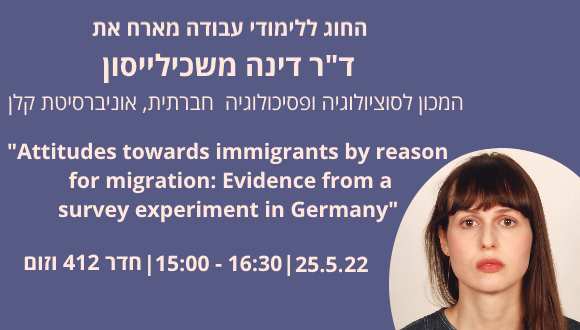Attitudes towards immigrants by reason for migration
סמינר מחלקתי
החוג ללימודי עבודה מארח את:
ד"ר דינה משכילייסון,
המכון לסוציולוגיה ופסיכולוגיה חברתית, אוניברסיטת קלן
המפגש יתקיים25.5.2022 בחדר 412 בבניין נפתלי בשעה 15:00 וישודר גם בזום
"Attitudes towards immigrants by reason for migration: Evidence from a survey experiment in Germany"
Abstract
This experimental survey study aims at examining the differential impact of immigrant’s attributes on anti-immigrant attitudes among the native population in Germany. Recent immigrants represent a very heterogeneous group that may differ, for example, by reason for migration, socioeconomic status, country of origin, religious denomination. Yet, most of the previous studies have defined immigrants in general terms, disregarding the possibility that the respondents may have a specific subgroup of immigrants in mind while expressing their attitudes towards them. A few existing experimental studies have revealed that anti-immigrant attitudes vary across different groups of immigrants by a large number of economic and cultural attributes of immigrants (e.g., level of religiosity, country of origin, education, occupation, or criminality). The mechanisms behind diverse attitudes towards different immigrant groups, however, still remain underexplored. Therefore, in attempt to disentangle the sources of the attitudes towards different immigrant subgroups, this study differentiates immigrants by six attributes (i.e., reason for migration, country of origin, religious denomination, criminal background, gender, and education). Using theoretical premises based on perceived threat, racial prejudice, and perceptions of deservingness, this study examines to what extent immigrant attributes affect the formation of anti-immigrant attitudes.
To this end, we conducted a multifactorial vignette survey experiment (2x2x3x4x2x2 between-subject design, i.e., NVignettes=192) within a nation-wide sample of the native adult population in Germany (NRespondents=2,247). Therein, we experimentally varied profiles of fictitious immigrants regarding six attributes: gender, country of origin, educational qualification, religious denomination, reason for migration, and absence or presence of (not severe) criminal record. After reading the profiles, respondents express their attitudes towards granting the respective immigrant the right to live in Germany, equal citizens’ rights, a working permission, and accepting the immigrant to live in the same neighborhood.
Our results revealed more negative attitudes towards immigrants coming for economic reasons as compared to re-union with the partner (already residing in Germany) and especially towards those coming due to violence-related threats in the country of origin (war and conflicts). Syrian immigrants were received more positively than Ukrainian (and partially Nigerian immigrants). Attitudes towards Muslim immigrants were also more negative (as compared to Christian immigrants). Low education and involvement in crime as well as partially male gender were also reasons for negative attitudes. Certain reasons for migration such as coming from a country with violent conflicts partially mitigated negative attitudes. This may indicate that humanitarian needs can, at least hypothetically, outperform potential threats and prejudice.
Thus, this study provides insights about which immigrant groups are at higher risk of experiencing more negative attitudes in Germany, contributing to the literature on sources of anti-immigrant attitudes in host societies.


